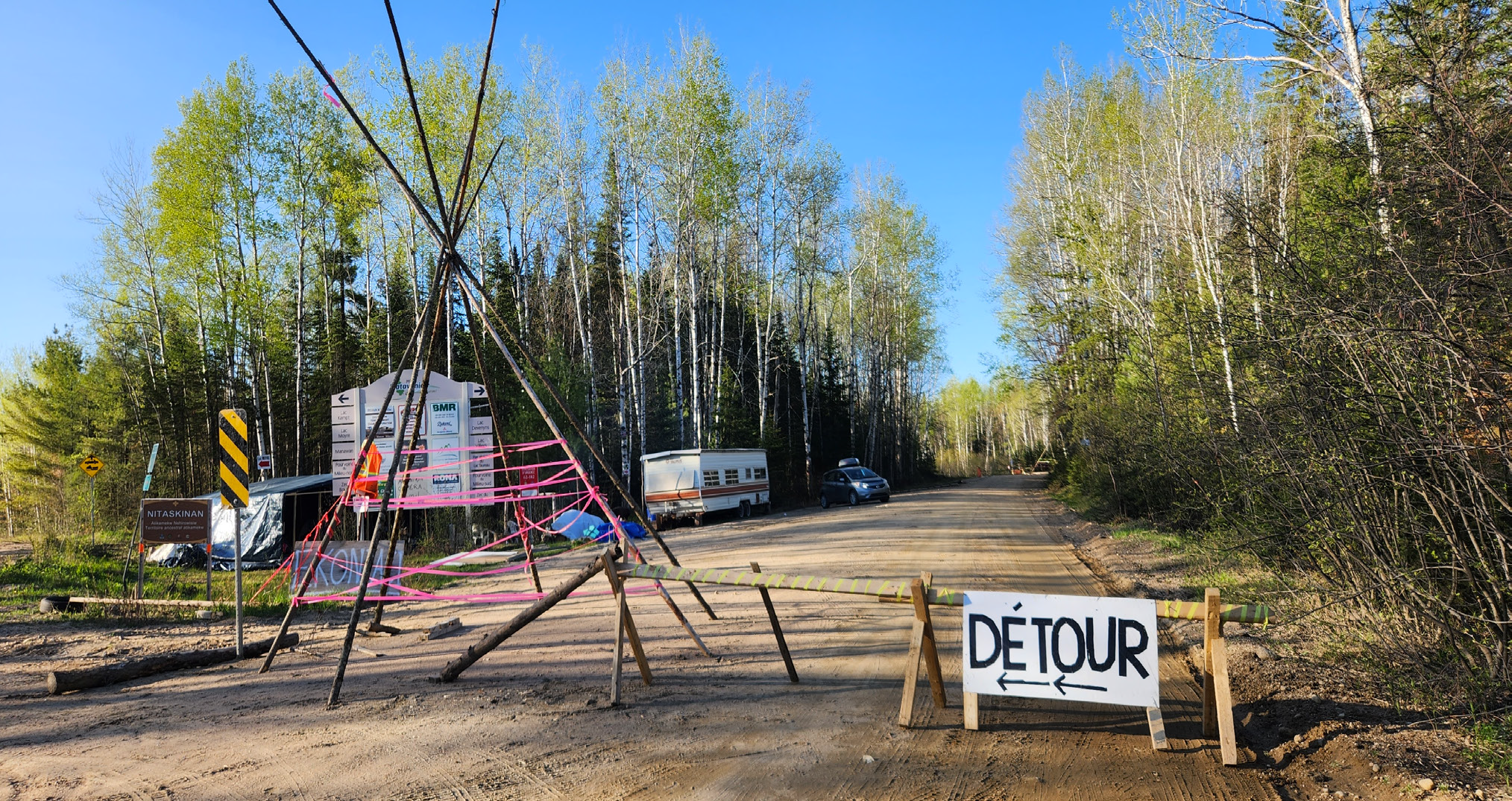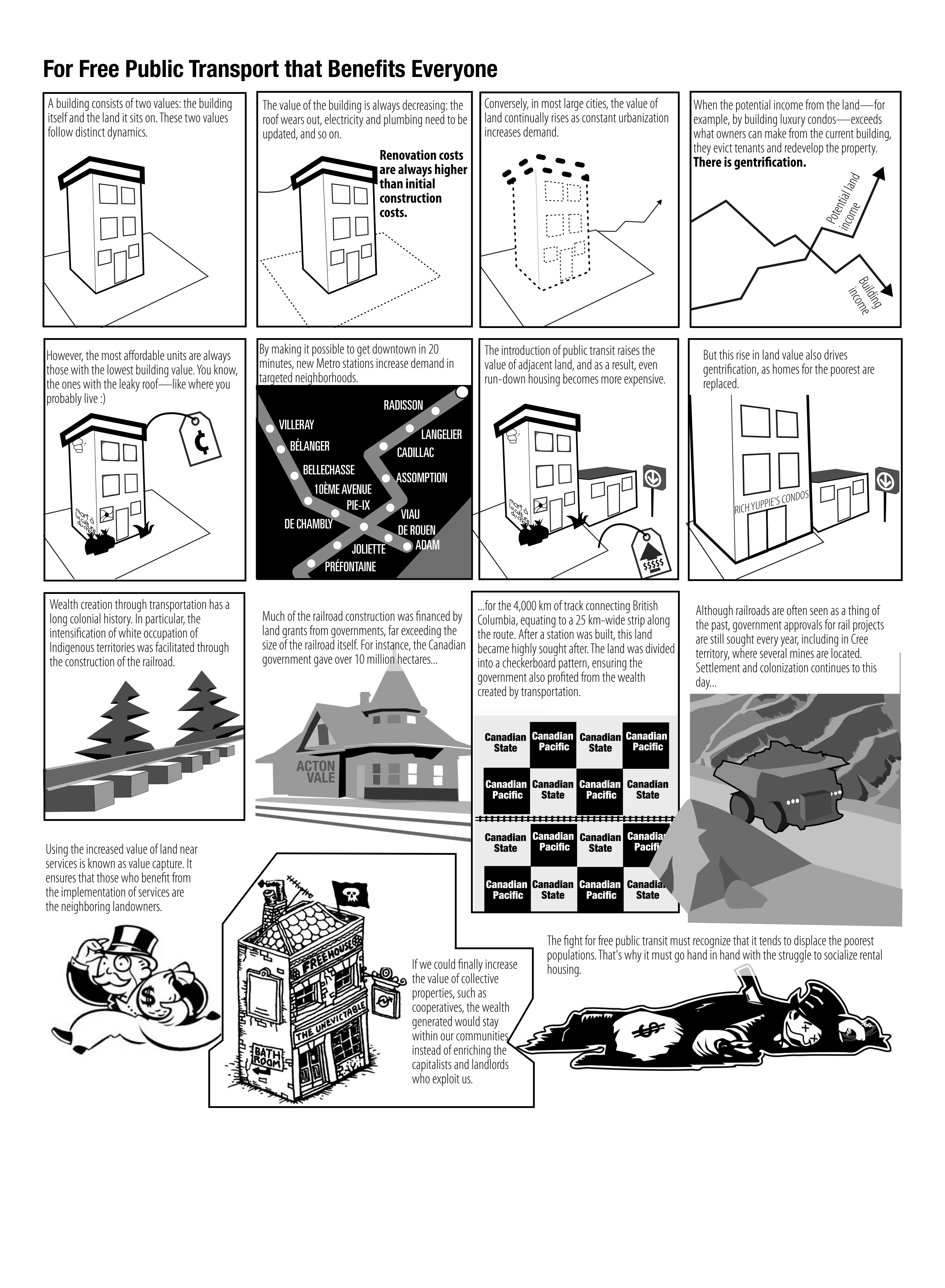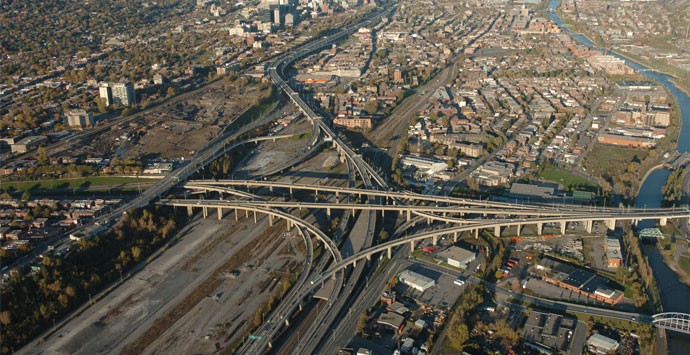 Même si la ministre de l’environnement (et des parcs!) britanno-colombienne a renouvellé l’approbation environnementale du PRGT, si on est assez rapides et efficaces, on peut empêcher sa construction: ce combat peut-être gagné. En effet, comme pour tout projet d’infrastructures, une approbation, permis ou autre ne signifie pas nécessairement que le projet se mettra en marche.
Même si la ministre de l’environnement (et des parcs!) britanno-colombienne a renouvellé l’approbation environnementale du PRGT, si on est assez rapides et efficaces, on peut empêcher sa construction: ce combat peut-être gagné. En effet, comme pour tout projet d’infrastructures, une approbation, permis ou autre ne signifie pas nécessairement que le projet se mettra en marche.
Despite more than a decade of fierce resistance and sustained struggles against Coastal GasLink (CGL) and TC Energy—the predecessor to PRGT on unceded Wet'suwet'en territory—the fall of 2022 marked a tragic turning point for the Yintah and the fragile ecosystem that depends on it. The start of construction under the Wedzin Kwa, the sacred river, dealt a heavy blow to defenders of this ancestral Land and to those fighting to preserve the ecological balance of the area.
For a decade, Wet'suwet'en hereditary chiefs and Land defenders have been fighting the construction of Phase 1 of the Coastal GasLink (CGL) pipeline. A hyper-militarized unit of the Royal Canadian Mounted Police (RCMP), the C-IRG (now renamed the Critical Response Unit), has repeatedly invaded the Yintah, Wet'suwet'en ancestral territory, arresting defenders with weapons, police dogs, and even subjecting them to torture sessions. Activists are currently suing the RCMP for violating their rights under the Canadian Charter.
Many people wonder why non-Indigenous environmental struggles often align with those of Indigenous comrades fighting against colonialism. These include the Shut Down Canada movement in 2019-2020 against the CGL pipeline on Wet'suwet'en territory, the #NoDAPL movement against the Dakota Access Pipeline, the protests against Enbridge's Line 3 pipeline in Minnesota, and the ongoing struggle against the PRGT pipeline project on Gitxsan territory.
The aim of this article is to critically examine developments in Canadian law regarding the definition of “Indigenous title” (a collective right to land, sometimes referred to as “Aboriginal title”), placing them within the broader history of dispossession. This history has been shaped as much by the economic objectives of the colonial State as by the complicity of its justice system. While acknowledging the progress made by First Nations in the legal arena, it is important to recognize its limits.
As the movement for Palestine has grown exponentially since late 2023, it is important to understand where part of Israel’s model of occupation comes from: right here in so-called Canada.
As Gabor Maté, a Holocaust survivor, explains: "They're both countries founded on the extirpation of Indigenous cultures and the displacement of Indigenous people."
The conflict between the Gitxsan and so-called Canada highlights the State's inherently colonial relationship with Indigenous peoples. In 1868, Queen Victoria transferred the territory of the Hudson's Bay Company to the Dominion of Canada, making the Canadian government the owner of lands already occupied by hundreds of thousands of people. Since then, colonial authorities have continued to suppress the inhabitants of these lands, who resist and fight to preserve their traditional way of life.
The fossil fuel industry, the politicians across the political spectrum that continue to support it, and right-wing think tanks understand that the increased power of Indigenous nations asserting their sovereignty on their lands poses a threat to the expansion of extractive industry. This is why companies and governments are actively working to establish social acceptability for their projects on Indigenous lands. Their new strategy is to adopt the concepts of "economic reconciliation" and partnership with Indigenous communities.
PRGT: Another Predatory Strategy
What is the PRGT? It is a new pipeline project in British Columbia. The Gitxsan and Gitanyow peoples are actively fighting to protect their ancestral territories.
It's simple: we don't want your oil, gas, and mining projects. Not only are we opposed to them, but we are actively fighting—and will continue to fight—to abolish all colonial extractive projects, wherever they may be. We don’t want your oil, gas, and mining projects, and they won't go through, border tariffs or not.

We've looked at why and how land-use planning and the current transport system make us dependent on the car. We've also seen the limits of public transport today, and the pitfalls to be avoided to make these services truly accessible to all in the future. But where do we start to reverse car culture? What can we do in the face of all this disaster? Here's three ideas: sabotage, reappropriate, collectivize.
 Montreal’s public transit, once touted as a hallmark of urban modernity, now stumbles under the weight of its own failings. Delays, inadequate service coverage, and high fares define the daily commute for thousands, while the elderly and disabled are left navigating an indifferent system that barely acknowledges their existence.
Montreal’s public transit, once touted as a hallmark of urban modernity, now stumbles under the weight of its own failings. Delays, inadequate service coverage, and high fares define the daily commute for thousands, while the elderly and disabled are left navigating an indifferent system that barely acknowledges their existence.
 The editorial team of this newspaper has not been able to fully address all the issues involved in truly accessible transport for everyone. One major issue is the limited consideration given to people with disabilities or those experiencing mental health challenges.
The editorial team of this newspaper has not been able to fully address all the issues involved in truly accessible transport for everyone. One major issue is the limited consideration given to people with disabilities or those experiencing mental health challenges.
A free, accessible public transit system that truly meets our needs benefits everyone, including those who use active transportation! Here are four key benefits:

 Let's do a brief thought exercise. Capitalism was born within a relatively functional society: peasants working to survive, organizing their own needs, while being parasitized by royalty and nobility, yet still free to produce what they deemed necessary and consume part of it. In contrast, today's economic logic dictates what we consume.
Let's do a brief thought exercise. Capitalism was born within a relatively functional society: peasants working to survive, organizing their own needs, while being parasitized by royalty and nobility, yet still free to produce what they deemed necessary and consume part of it. In contrast, today's economic logic dictates what we consume.
Free public transport is not a utopia, but could it be a panacea? There are many positive aspects to advocating for free public transport, but in a capitalist system, we must remain vigilant, as this demand could be co-opted by the wealthy.

To legitimize the reign of the automobile, it's often argued that these machines are indispensable for travel between cities and to regions far from major urban centers. How do you get from Saint-Bruno-de-Montarville to Montreal for an 8:30 a.m. work shift without a car? How can you buy food without a vehicle when the nearest grocery store is in the next village? How can you visit your parents in Dolbeau-Mistassini without driving?
What we want is clear: access to transportation for all.
These days, travelling medium to long distances is essential for work, grocery shopping, picking up children from school and daycare, visiting grandparents at the CHSLD, going to the dentist, helping friends move, connecting with green spaces, and more. In this context, transportation must be defended. It should not be reduced to a commodity or a source of profit: it's a necessity.
As capitalists around the world embark on a mass propaganda campaign to convince people that electrified vehicles represent our only way out of the climate crisis, they are in fact manufacturing consent for further mining and environmental devastation on Indigenous land, both at home and abroad. It is in large part from the expropriation and theft of these so-called "critical" minerals from Indigenous land that capitalist profits flow all the way up the supply chain, leaving nothing but pollution, poisoning, and human suffering in their wake.
Eco-anxiety arises from the constant barrage of global warming statistics, scientific reports confirming the irreparable damage to the environment, and media imagery painting climate change as a slow-motion apocalypse. These portrayals suggest that a multitude of catastrophes result from the choices each of us makes, such as you not selecting the right environmentally friendly products. Consequently, eco-anxiety manifests as a profound sense of distress, paralysis, and helplessness in the face of the harsh reality of the climate crisis.
The discourse surrounding the climate crisis has, for too long, been dominated by corporations and the media, which have presented unsatisfactory solutions. However, what could be more comforting than solutions that neatly fit on a convenient grocery list: purchasing organic and local foods, practicing zero-waste cooking, cleaning and maintaining the home with the most environmentally friendly products available, adopting a vegan diet, and opting for cycling or public transportation for all your shopping needs.
For several years, indigenous movements have been advocating for the acknowledgment of their ancestral rights to their territories and complete sovereignty over them. This is exemplified by the Ekoni Aci (Atikamekw) movement and the Mashk Assi (Innue) Collective. These communities are at the forefront of the battle to safeguard their lands against logging and mining encroachments while advocating for the recognition of their ancestral rights.

Since the beginning of the year, we have witnessed the recurring spectacle of the extensive use of state violence against environmental movements. Despite their undeniable significance, these events received minimal coverage from the mainstream media. In the following paragraphs, I will provide a brief overview of two such incidents.
When we scrutinize economic growth primarily through the lens of tangible measures (such as metric tons of natural resources, greenhouse gases, hectares of land, etc.) rather than its monetary value (GDP), its true nature emerges as a zero-sum, if not a negative-sum game. Where there is economic growth in one place, there is typically loss and devastation elsewhere. This "elsewhere" encompasses distant human societies, ecosystems, non-human life forms, and more.
What is a diversity of tactics? Put simply, it is the principle that allows all affinity or more formal groups with compatible objectives to choose the strategies and tactics they prefer, without denouncing or discrediting one another.

For the health of our communities and our ecosystems: less asphalt, more flowers!
Today, more than ever in human history, fewer and fewer people are able to recognize even a few wild plants. Plant blindness is the inability of many people, even those who study the natural sciences, to identify plants, distinguish them from each other, and name them. It is the inability to see or notice plants in one's own environment. Capitalism disconnects us from nature (and from other human beings too). Under its rule, people who know their environment deeply and truly are becoming an endangered species.
(inspired by stupid websites and basic knowledge of some astro-queers ;) )
For everyone:
Love: <3 <3 <3
Friendship: <3 <3 <3
Chance: <3 because ACAB
$: FUCK CAPITALISM
Aries (March 20 – April 19)
Banks and global NGOs are ready for the big leap towards biodiversity credits, as announced by a 40-page OECD document on biodiversity credits. However, the introduction of carbon credits since the Kyoto Protocol have not improved anything 15 years later. Let's see why it is imperative to refuse these kinds of solutions to the decline of biodiversity.
The last decade (2011-2020) was the UN's biodiversity decade, where countries worldwide "worked to address the many causes of biodiversity loss," according to the UN secretary-general. Countries had set 20 targets, also called "Aichi targets," none of which have been met. These targets were to be reviewed in 2020, but COP15 was postponed due to the pandemic. Therefore, the countries will question themselves this December to know what they will do afterward. Above all, the general idea of these objectives is simple: we should live in harmony with nature by 2050.
The COP15 is highly effective at promoting an "asset management" approach to biodiversity that actually enables capitalists to generate profit from ecological degradation, while forcing communities in the global South to provide greater access and control over their land to governments and powerful NGOs in the global North. Since the turn to models of sustainable development in the 1990s, UN agencies have strongly championed the idea that economic growth is compatible with ecological preservation.
Ecofeminism is a branch of feminism that focuses on the intersection of feminism and ecology. Ecofeminists argue that economic development and the destruction of ecosystems have profound and negative repercussions for women — especially women of the global South. Furthermore, they argue that capitalism is grounded in both the exploitation of women's reproductive labor and the exploitation of nature.
We are all concerned about the protection of biodiversity. We are headed for a wall. The consequences of capitalism will soon be irreversible. The COP15 is an illusion that only accelerates the destruction of habitats and wildlife populations. Opposing the COP15 allows us to make our voices heard in a way that is different from that of the oil companies, the corporations and the States. We must use this mobilization to regroup and act against the states and companies responsible for the decline of biodiversity.
A word that is more and more frequently used in reflections on the unequal dynamics between the North and the global South is extractivism. To demystify it a little, here is a short article that will give a very brief presentation.
Many of the Green capitalist projects financed by COP15 initiatives (financing for green transport, policies that limit unrestrained development, etc.) seem genuinely worthwhile compared to the alternative of doing literally nothing in the face of unrestrained free-market capitalism– and in this way, capitalists and the governments that support them rebrand themselves as "wildlife saviours" at conferences like COP15.
In preparation for the upcoming COP15 meeting, the Canadian government has made itself a part of the "High Ambition Coalition for Nature and People". According to the coalition's website, it is "working towards a global agreement to protect at least 30% of the world's land and oceans by 2030 at the 15th Conference of the Parties to the Convention on Biological Diversity (COP15)".
In November 2018, COP14 was held in Egypt. We believe it is important to revisit the outcomes that emerged from this last conference of the stakeholders of the Convention on Biological Diversity (CBD) to highlight why relying on these conferences to prevent biodiversity decline is dangerous. Our reading of the COP14 outcomes is based on the decision documents approved by the parties present at the convention.
While there were counter-summits and demonstrations at international summits in the 1980s, for example in West Berlin, or against the World Economic Forum in Davos, Switzerland in the 1990s, it was really the World Trade Organization (WTO) Summit in Seattle in November 1999 that launched the tradition of anti-globalization demonstrations.











